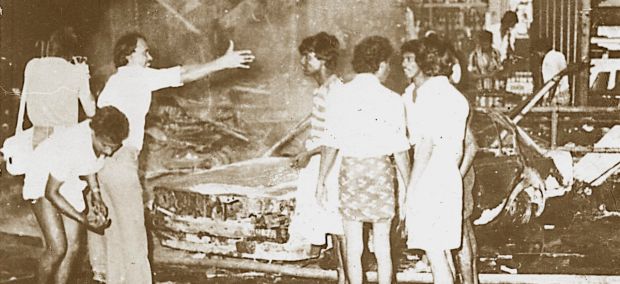Black July: A painful memory, a necessary reckoning
By Hana Ibrahim
Sri Lanka on Wednesday (23) marked the 42nd anniversary of Black July, one of its darkest weeks in its post-independence history. What began as a reaction to the killing of 13 soldiers by the Liberation Tigers of Tamil Eelam (LTTE) in Jaffna in 1983 quickly spiralled into an orgy of anti-Tamil violence across Colombo and beyond. For days, mobs roamed the streets while law enforcement and the government stood by, paralyzed or complicit. The death toll remains disputed -some say hundreds, others say thousands. What is certain is that tens of thousands of Tamil citizens lost their homes, livelihoods, and sense of belonging in their own country.
Forty-two years later, the legacy of Black July still casts a long shadow. It was the moment Sri Lanka’s ethnic fault lines erupted with such ferocity that it convinced a generation of Tamil youth that peaceful coexistence within a centralized Sri Lankan state was impossible. The civil war that followed lasted nearly three decades and claimed over 100,000 lives. And yet, despite the immense cost in blood and suffering, the deeper political and institutional causes of July 1983 remain largely unaddressed.
One of the most disturbing aspects of Black July is the extent to which the state failed—failed to prevent the violence, failed to protect its citizens, and failed to prosecute those responsible. Many Sinhalese and Muslim neighbours risked their lives to shield Tamil families, and their bravery is a crucial part of this history. But these individual acts of courage stand in stark contrast to the silence and inaction of those in power. For many, the horror of that week is not only the violence itself, but the impunity that followed. It is this impunity that continues to haunt Sri Lanka today, from the unresolved Easter Sunday bombings of 2019 to the long-hidden Chemmani mass graves of the 1990s.
Sri Lanka is not alone in facing the challenges of reckoning with a painful past. Spain, Rwanda, Cambodia, Argentina and South Africa, among many others, have similarly wrestled with histories marked by internal conflict, atrocities, and periods of denial. This is why the concept of transitional justice was developed: to help societies fractured by violence begin to repair themselves through truth-telling, accountability, reparations, and institutional reform. The first step in that process is truth. Not myth, not silence, not political spin—but truth.
The government’s proposed Truth and Reconciliation Commission (TRC) is a potential mechanism to begin this process. Its draft legislation rightly includes the period beginning July 24, 1983, as falling within its scope. However, the TRC cannot be just another symbolic gesture. For it to be credible, it must examine Black July in depth and make its findings public. Younger generations, born long after the violence, deserve to know what happened and why. If Sri Lanka is to break free from the cycles of denial and resentment, it must confront this past openly.
But truth alone is not enough. Reconciliation must be forward-looking. It must translate into political and structural reforms that guarantee equality, dignity, and participation for all communities. This includes addressing the root causes of the conflict—chief among them the centralization of political power and the exclusion of ethnic and religious minorities from national decision-making.
The provincial council system, introduced in 1987 through the 13th Amendment, was intended as a step toward devolved governance. It offered minority communities a degree of self-rule and local decision-making power. Yet today, that promise remains unfulfilled. No provincial council elections have been held since 2018. Provinces are effectively governed by presidentially appointed governors, undermining the spirit of democracy and inclusion.
The current government, elected on a platform of ‘system change’, has made encouraging progress in some areas. Wasteful spending has been reduced, political privilege curtailed, and long-stalled legal proceedings against corrupt officials have begun to move forward. Yet, on the crucial issue of power-sharing and political inclusion, the pace of reform remains disappointingly slow.
The devolution of power is not a concession to separatism. It is a foundation for unity. India and Canada, and even Switzerland have shown that multi-ethnic, multi-religious states can thrive through decentralization. In Sri Lanka, meaningful devolution could correct the persistent imbalances between Colombo and the rest of the country, give voice to historically marginalized communities, and build confidence in a shared national identity.
Reactivating and reforming the provincial council system would not only honour past promises but also serve as a powerful counter-narrative to the divisive politics that fuelled events like Black July. It would send a clear message that the state is committed to equal citizenship—not just in words, but in practice.
More than four decades have passed since Black July, yet its wounds remain open and festering because justice has never been done. No senior official was held accountable. No serious institutional reforms followed. Meanwhile, each new generation risks growing up without knowing this history or learning from it. This silence is dangerous. It leaves space for prejudice, revisionism, and political manipulation.
Black July must not be allowed to be a fading memory, but an occasion for national reflection and an opportunity to recommit to building a country where such violence is unthinkable—not just because it is morally wrong, but because the systems and safeguards are in place to prevent it.
The lesson of Black July is not only about what went wrong in 1983, but what continues to go wrong when states fail to protect all their citizens equally. As Sri Lanka moves forward under a government that claims to champion justice, transparency, and reform, it has a responsibility to confront this history honestly.
Truth-seeking, reconciliation, and institutional reform are not luxuries; they are necessities for a country that hopes to be whole. The tragedy of Black July must never be repeated. The only way to ensure that is to face it—fully, publicly, and without fear.
Only then can Sri Lanka begin to heal.
-ENCL



Comments are closed, but trackbacks and pingbacks are open.